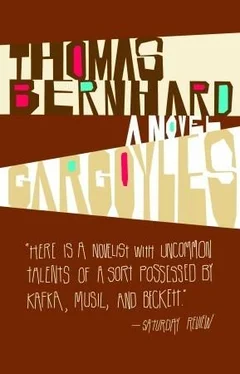While I took my seat in the wagon beside the innkeeper, who drove, my father sat behind us next to the patient.
During the whole ride, which we shortened by cutting across Krennhof, the innkeeper and I did not exchange a word. Because of the early hour the drive went quickly and easily. I had not been in this vicinity for a long time, I realized. I had to think far back to my earliest childhood to catch a glimpse of myself here and there playing by Gradner Brook. It struck me how seldom I had accompanied my father on his rounds, and that ever since my mother’s death I had been left entirely to myself. It is the same for my sister, who must be feeling it even more painfully than I.
In keeping with our mood, I imagine, the innkeeper, who had talked so much on the way to Gradenberg, did not say a word on the way to Köflach. It would hardly have been fitting for me to strike up any conversation with him. If I had understood my father right, there was little hope that the woman would survive the ride to Köflach. But when the hospital attendants lifted her out of the wagon, she was not yet dead. She died, however, while we were still in the hospital, before she could be brought into the only operating room, and her husband sensed the moment of her passing. While the attendants were wheeling her down the corridor, he had held her hand and wept. They did not let him stay with the body, but led him down to the courtyard where, left entirely to himself, he had to wait half an hour for my father. I let him alone, but unobtrusively kept watch over him. Then my father came down and walked about the yard with him, trying to calm him. He spoke to the innkeeper of the things that had to be done now, about arranging the funeral, the inquest, filing a charge against Grössl for manslaughter. It would be wise for him to stay around people now, my father said, not to isolate himself in his anguish, withdraw into his pain. My father said he would take care of certain necessary errands, like going to court, and would accompany him on others to ease his grief, first of all to see his wife who was being moved to the autopsy room.
My father said that he had diagnosed a cerebral hemorrhage, which would have been fatal in any case. He would be receiving the exact details of the autopsy from the district coroner later in the morning. It was of no importance that the innkeeper had not notified him of the fatal blow until three hours after the incident, my father said. The woman could not have been saved. The deceased woman was thirty-three, and my father had known her for years. It had always seemed to him that innkeepers treated their wives with extreme callousness, he said. They themselves usually went to bed early, having overworked themselves all day on their slaughtering, their cattle dealing, their farms. But because they thought of nothing but the business, they left their wives to take care of the taverns until the early morning hours, exposed to the male clients who drank steadily so that as the night wore on their natural brutality became less and less restrained. My father said this to me in an interval when we fell a bit behind the innkeeper, who was walking with us but seemed in a total daze. “All these long drinking bouts end badly,” my father said. “And in this region a high percentage of them end in a fatality. The innkeepers’ own wives are often the victims; the innkeepers set these helpless women to tending the public rooms so they can extract every penny from their drunken patrons by pouring the cheapest brandy into their unresisting guts.”
When we had caught up to the innkeeper again, my father assured him that it would be easy to find Grössl now that the police were informed of it all. No matter where he was holed up, Grössl would not be able to stay hidden long. The innkeeper’s tears and distraught air were affecting precisely because his dealings with cattle and the tavern world had made him the embodiment of the district’s characteristic brutality. But the more my father tried to talk to him, the more pointless the effort seemed. Finally my father contented himself with giving the man the necessary instructions in what I thought a very simple and easily understood way. Then we left him to himself again.
My father went to the autopsy room and talked with the coroner and his assistants. Meanwhile I kept an eye on the innkeeper as he sat on the single bench in the hospital yard. I guessed that his wife’s body was in the two-wheeled morgue cart that a young attendant pushed past me. The sight of the morgue cart was nothing new to me, for my way to school had led past the hospital and I often used to pause at the spot where the morgue could be seen between two elderberry bushes so I could look at the cart that stood by the entrance to the morgue day and night when it was not in use. It was housed in an open shed on the side of the building visible to me. This sheet-metal morgue cart had always had a macabre fascination for me, and often appeared as a major, horrible prop on the stage of my childhood dreams. The young attendant, barely past school age, pushed the cart to the entrance of the morgue, and I heard my father coming from that direction. We went out of the hospital yard, moving quickly along the walls so as to keep out of sight of the innkeeper, who was still sitting on the bench. My father, I thought, wherever he feels at home, which is with patients and in hospitals, doesn’t act as if he were part of a vast, opaque business organization, though that’s what people accuse doctors of nowadays, but rather as I’ve seen him act today, as if he were part of a more and more crystal-clear science. I suppose there are many doctors like some I have met who are nothing but businessmen, and talk and act like businessmen even when they have keen scientific minds. But my father isn’t one of them.
“You see nothing but sad sights when you come along with me,” my father said. “That’s why I hesitate most of the time to have you come along on my calls, because it turns out that everyone I have to visit and touch and treat proves to be sick and sad.” No matter what the trouble was, he went on, he was continually moving about in a sick world among sick people, sick individuals; and even though this world might claim, might even pretend, to be healthy, it was still sick and the people, the individuals, were always sick, even the so-called healthy ones. “I’m accustomed to that, but it might possibly upset you, might give you harmful thoughts. I’ve noticed you tend to be upset by everything and everyone, to think about everything and everyone in a harmful way.” And my sister did the same, to an even more dangerous extent, he went on. “But it would be wrong to refuse to face the fact that everything is fundamentally sick and sad” —those were his very words — and for that reason he was now and again “tempted” to take me or my sister along on his sick-calls. “It’s always a risk,” he said. Most of all, he added, he was afraid that one of us, my sister or I, could be harmed for life by seeing a patient and his illness, whereas he meant it to have just the opposite effect.
We went on into Köflach. He wanted to go to the bank and the post office, but they were still closed, and so he took me along to a lawyer friend of his who had been a fellow student at the university in Graz. I knew the man from his summer visits to us. He was a successful lawyer specializing in real estate. My father was hoping his friend would provide us with breakfast.
We rang. The door was opened, and we entered an apartment that was furnished opulently by the standards of a small town and at first glance had a very cosy look about it, although the individual pieces were not especially tasteful. The first thing you noticed was the many chairs and couches. The lawyer’s young wife received us and at once ushered us into the dining room. Before long the lawyer himself appeared. My father said he had only a little time; he had to return home with me. During the breakfast, for which we had arrived just in time and which was more lavish than any I have ever eaten, I sat where I could look down into the street and watch what was going on there as we talked about Grössl’s murder of the innkeeper’s wife. My father remarked that it was horrible how people went at each other without knowing why, especially in the taverns, as soon as they lost their ordinary inhibitions. He was sure, he said, that this fellow Grössl did not know why he had knocked down the innkeeper’s wife. “It may be,” my father said, “that he doesn’t even know that he killed her.” Nowadays, he went on, the country people who first degenerate into brutality and then into total helplessness about their brutality, who degenerate in all respects and cannot help themselves, are alarmingly in the majority.
Читать дальше












